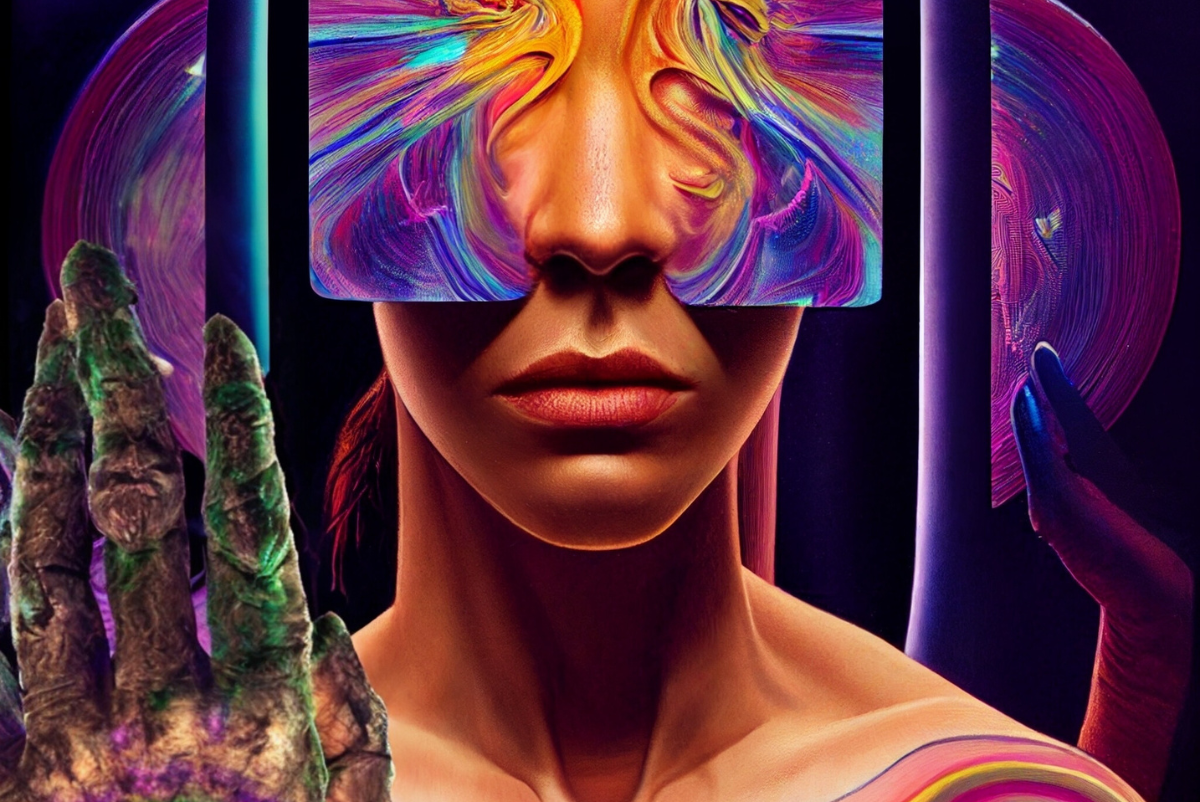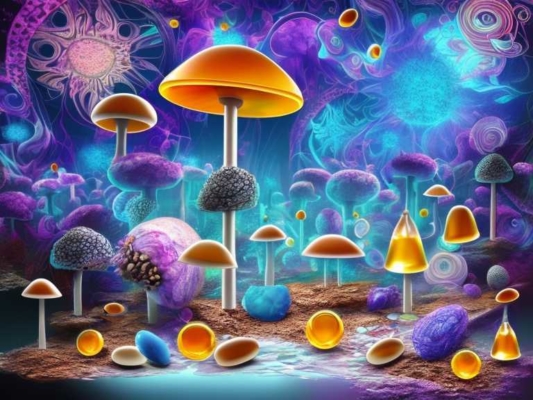
This article isn’t meant to scare you, but I first and foremost want to say that psychedelics aren’t for everyone, and depending on the type of work you’re seeking to do, and the state of your body, there are other alternatives that may be equally or more supportive.
I say this because last summer, I had an incredibly difficult time after a guided psychedelic therapy experience with MDMA. A lot of the issues I dealt with stemmed from the guide I was working with, which you can read about here.
In this piece, I’ll share more about what happened after that journey, and how I was able to recover from such an extreme experience.
Leading up to the experience
In the months prior to my MDMA experience, I’d been working like hell. I was constantly “on the grind,” and I was doing what earlier parts of my life had taught me I needed to do to move forward —pushing my body as much as was necessary to get the work done. We were also in the midst of our second year of the pandemic, and I was dealing with a lot outside of my work as well, including working through processing some traumatic material from my past.
For obvious reasons, this created a high load of stress and anxiety for me. I had also started eating meat again after four years of being a vegetarian, and my body was giving me some pretty strong feedback that it was overwhelmed by that too. As I was falling asleep at night, I had begun to hear voices occasionally say something (my name, for example). It felt real, and it was scaring the shit out of me.
I believed that to help me process some of my past, a guided MDMA experience could be a good option for me. I found a therapist who I felt that I trusted and who I had worked with for several sessions before deciding to do a guided journey with them.
The morning of my experience, my inner voice was telling me how scared I was. I asked my therapist about the risk of psychosis and expressed some very real fears around having a bad “comedown.” To both of these concerns, he reassured me that the odds were incredibly low, and that I should be perfectly fine. I was in a very vulnerable place, and I did all I felt I could, which was to decide to trust him.
Reflections on the psychedelic therapy experience
I would describe my experience of doing MDMA-assisted psychotherapy as helpful, but disappointing. While my therapist and I did what felt like some good processing work around traumatic parts of my past, I felt disappointed by the lack of intensity of the experience. Compared to stories I’d heard about people reliving traumatic memories, it didn’t at all feel like I was reliving or feeling into those experiences —if anything I had to work hard to recall them.
My guess is that for the majority of people who take MDMA for the first time, doing therapy alongside it would be a profound experience. But in truth, I’d probably taken MDMA something like 50+ times over the years before I went into this experience. So to me, it just felt like doing therapy and being high at the same time, rather than the highly touted “MDMA-assisted therapy” where doing both at once creates a novel and superior experience.
I had also made a promise to myself a few years earlier that I would stop taking MDMA, because I’d taken it while partying so many times. When I stopped, it was because I was noticing that the afterglow I’d initially experienced some years before had stopped happening, and instead I felt increasingly like I would come out of my MDMA experiences and fall into a hostile pit of despair and anxiety that took a day or two to crawl out of. But those comedowns were nothing like what happened this time.
Later that night…
As I was going to bed I felt fine, like nothing was out of the usual.
A few hours later, I was awoken by what I can only guess it would feel like to be struck by a lightning bolt and hit by a car at the same time. The sensation was as if a high-voltage electrical signal went through my spine and then randomly out into different parts of my body.
In the weeks leading up to my experience, I’d been noticing a rather sinister image of what I’ll call a demon hanging from a tree in my yard. I’d never actually seen this with my eyes, but when I walked past the tree, I regularly thought about this image. It had felt a little frightening, but I wasn’t sure what to think of it. Now, the image felt endlessly more real, like whatever had just happened to me had removed any protective layers between me and this monstrous undead creature (which I later realized was a projection based on my fears and traumas). As I was awoken by this lighting bolt sensation, I suddenly had the feeling that this creature was in my backyard, trying to come after me.
For the past few years, I’d been dealing with severe intrusive thoughts, sometimes hundreds of times per day. But this was a whole new level in terms of how real my thoughts felt. As I said, I had been worried I was at risk of psychosis before my experience. Now it felt as if I was actually going psychotic.
I was scared shitless. Anxiety rushed through me. Was I going to be okay? I took some deep breaths, then decided to take some of the 5-HTP supplement my therapist had given me in the hopes that it would help calm me down. I tried to ignore what was happening, relax, and keep sleeping.
I slept miserably, and awoke a couple more times that night, each time with a deep sense of paranoia running through me. I continued to feel as if the demon I described earlier was coming after me.
The paranoia lasted through the majority of the next few days. It worsened in the evenings after it got dark, and was intermittent and unpredictable through the days for several months after that. I often felt perpetually unsafe, I had nightmares of this demon most nights (sometimes multiple times per night), and to top it all off, I dove right back into my work with full force.
I had also started experiencing brain zaps, a common symptom of going off antidepressants (which I’d never taken) but can also be experienced as an after-effect of MDMA. From what I gather it’s related to inflammation in the brain, and maybe some kind of neurotransmitter imbalance, though I’m really not sure and the research seems to be limited on this topic.
For months these symptoms continued —recurrent nightmares, anxiety, paranoia, and intrusive thoughts of this demon figure that I felt wanted to come after me. I also felt more anxious than ever in cars, and loud sounds startled me and easily set off feelings of panic. Though I was never formally diagnosed, I eventually realized that these were all symptoms of PTSD.
I ended up moving back home with my parents for a few months with the hopes that the nurturing feelings of home would be supportive. Going home helped, but it took a lot more than that to help me heal through this.
Here’s what my recovery process looked like
Before I start sharing this, I just want to make note that this isn’t medical advice. This is my own subjective experience, and what worked for me might not work for everyone.
One of the first things that provided relief was taking CBD oil. This helped to reduce my anxiety, improve my sleep, and reduce the frequency of my nightmares. This was more of a “band aid” than a cure, but in my opinion a far safer and more predictable option than the antidepressants some people recommended to me.
The most important part of my recovery process was neurofeedback. EEG-based neurofeedback is a process of training different parts of your brain to produce different frequencies of brain waves (alpha, beta, theta).
This training is done using feedback in the form of lights and sounds that activate based on what electronic sensors read that your brain is doing. Neurofeedback is generally quite expensive, and from what I know it is not often covered by insurance, but it can be very effective for healing a dysregulated brain and nervous system. It is one of the 5 primary solutions for PTSD that are described in the highly praised book The Body Keeps the Score.
I did about 20 sessions of neurofeedback over the course of 6 months. The effect of this, along with a “pink noise” audio file they gave to me, was one of the most powerful forms of healing I’ve ever felt.
What made me believe so much in this modality was that during my first visit, my provider accurately described all of my symptoms to me, using only the data they had from a scan of my brain (I didn’t share a thing with them). I was also lucky to have access to an amazing clinic that personalizes the treatment based on a scan of your entire brain (many neurofeedback clinics just use a standardized protocol).
Long meditations also seemed to help. The specific styles of meditation I did most were “open awareness” and “quiet mind.” This helped to calm my brain and help me practice feeling like I was in control of it. The timeline varied, but meditating for 40 minutes to an hour each day was when I felt most at peace and like I was really conquering what remained of the symptoms I had been dealing with. This was shortly after finishing the neurofeedback and it definitely felt like there was a strong compounding effect between the two modalities.
I also did a lot of yoga and tai chi this year. This helped me to physically work stuck energy out of my body and re-establish a healthy brain-body connection. Doing this each morning for a couple of months helped me to start my days off feeling more present and aware in my body, rather than feeling disconnected and dissociated from it
I also started taking a supplement called Magnesium threonate. I found this to be extremely helpful with calming my mind down at night and helping me to get to sleep and stay asleep.
Lastly, I went back to therapy. One of the most profound things a therapist said to me was “you need to recognize that there’s a part of you that thinks there’s something wrong with you. Stop giving that part of you so much of your power.” Another therapist helped me to feel safe with some of the parts of myself and my mind that felt frightening. That was a truly special experience, and one that I’ll share about in another article.
So there you have it —this is how I “recovered.” It was an incredibly difficult journey. It was about a year between having extreme paranoia and what I thought was a psychosis, to feeling grounded and generally safe in my body.
I still have healing to do. I am only just getting comfortable with the idea of working with altered states of consciousness again. Moving forward, I will be far more careful before considering taking psychedelic medicines, and far more critical of who I trust to guide me.
I also believe that with enough effort, there is a powerful opportunity for me to do more of my self-discovery and inner work with endogenously-created altered states such as breathwork and meditation.
Finally, I want to share that I am incredibly grateful for all of the supportive friends, family, guides, practices, and resources that helped me to get through this, and to come home to myself.
Thank you for reading.
I am now running a personal growth community for people who work with altered states of consciousness, called Bonfire. If you are curious about finding support from like-minded people on similar journeys, I encourage you to reach out to me at jack@bonfire.earth.





